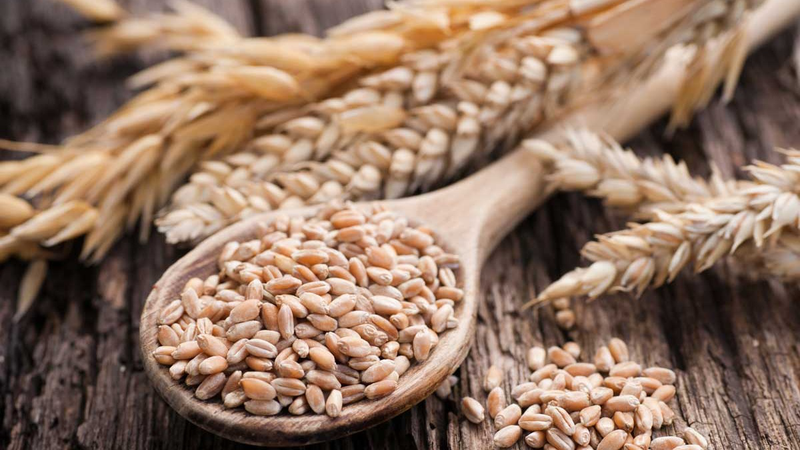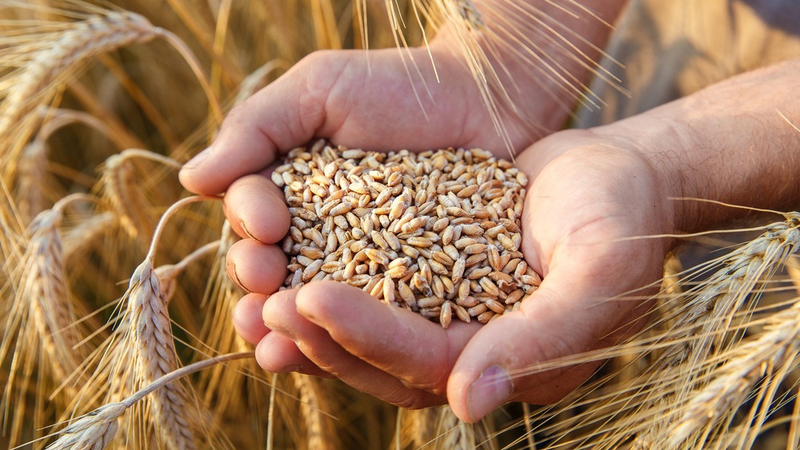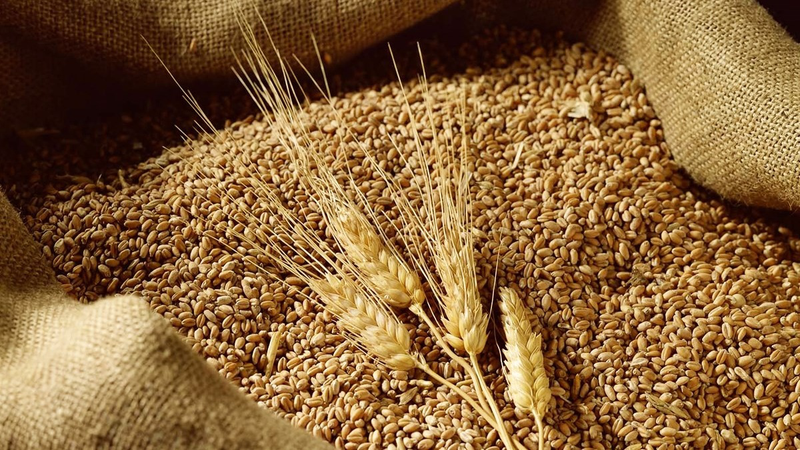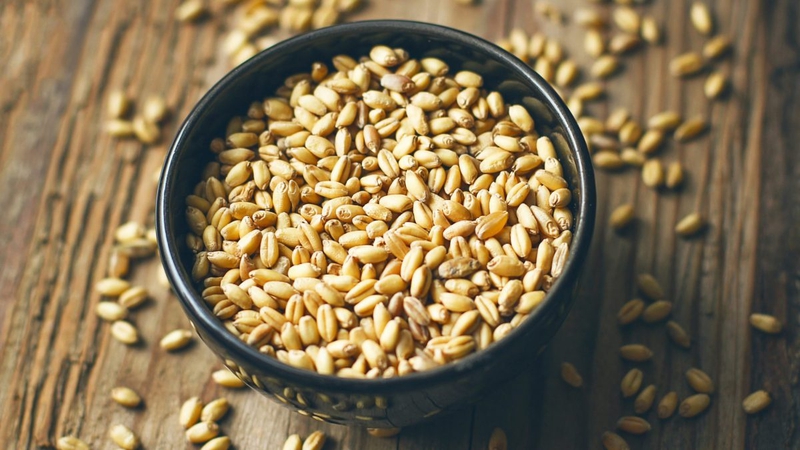Wheat is one of the most versatile grains when it comes to nutritional value and health benefits. Wheat grains can be found all over the world and are easy to incorporate into a variety of diets. Wheat has many health benefits such as controlling obesity, improving metabolism, preventing gallstones, etc.
Wheat is one of the oldest cultivated crops and has been a staple food for humans for thousands of years. Wheat grains originated in Southwest Asia and are now widely grown around the world.
Nutritional value of wheat grains
Wheat is one of the most important food crops in the world and is a major source of food for humans and animals. Wheat is grown in many places and has many different varieties, each with its own characteristics in grain quality, weather resistance, and processing methods.
Wheat grains contain many nutrients such as carbohydrates, proteins, vitamins and minerals, contributing significantly to providing nutrients for the body. In 100g of wheat grains contain:
- 15g protein;
- 10.6g fiber;
- 71.2g carbohydrates;
- 38mg calcium;
- 136mg magnesium;
- 352mg phosphorus;
- 376mg potassium;
- 39μg folate;
- 5.5mg niacin;
- 0.5mg thiamin.

Wheat grain is widely grown all over the world.
10 Health Benefits of Wheat
Wheat is a cereal grain that offers many health benefits. With its high nutritional content, wheat becomes the best food choice to improve digestion, fight chronic diseases, and strengthen the immune system.
Control obesity
Although wheat is known for its effects on controlling obesity, this benefit is much stronger in women than in men. Regular consumption of whole wheat products can actually help obese patients and can help them lose weight significantly.
When your body’s metabolism is not working at its optimal level, it can lead to many metabolic syndromes such as high triglycerides, visceral fat, and high blood pressure. This is why most doctors recommend including whole grains in your diet. Eating foods made from wheat helps in better metabolism, thus preventing these problems from arising in the first place.

Foods made from wheat help the body metabolize better
Prevent Type 2 Diabetes
Type 2 diabetes is a chronic disease and can be very dangerous if not properly controlled. Wheat grains contain a lot of magnesium, this mineral affects the way the body uses insulin and secretes glucose. Therefore, eating whole wheat regularly helps control blood sugar levels. By replacing rice in the daily diet with wheat, diabetics can easily control their sugar levels at a reasonable level.
Prevent gallstones
Whole wheat helps prevent gallstones effectively. Gallstones are formed due to excessive secretion of bile acids. Because wheat contains insoluble fiber, it helps the digestive system work more smoothly, the body secretes less bile acids, thereby limiting the risk of gallstones.
Prevent breast cancer
The bran in wheat grains has the effect of preventing breast cancer in women due to excessive estrogen levels. Wheat bran has the effect of optimizing estrogen levels so that they are always controlled, thereby effectively preventing this disease.
This effect is especially effective in premenopausal women who are at higher risk of developing this type of cancer. Furthermore, wheat also contains lignans that help control high circulating estrogen levels, effectively supporting cancer prevention.
Promotes Digestive Health in Women
We all know that wheat grains contain a large amount of fiber, which makes digestion easier. This means that the body needs less bile acid secretion to break down food. This can prevent colon cancer from occurring and generally promote better digestive health, especially in women.

Wheat is rich in fiber, which helps prevent colon cancer
Preventing Asthma in Children
With pollution levels continuing to rise, more and more children are at risk of developing asthma. However, adding wheat-based foods to your diet can reduce the risk of childhood asthma by at least 50% thanks to the magnesium and vitamin E content in wheat. However, wheat is also an allergen for many asthmatics, so patients should consult their doctor before using it.
Protects against cardiovascular disease
Plant lignans are a nutrient found in abundance in whole wheat that helps prevent cardiovascular disease. Wheat also increases good cholesterol (HDL) in the body, which is also an important role in preventing heart disease.
Reduces postmenopausal symptoms
Consuming more unrefined wheat products will provide a large amount of fiber and protein to the diet of menopausal women. This helps control hormone balance and minimize the unpleasant symptoms often encountered during this period.
Liver Detoxification
Wheat germ is a rich source of antioxidants and fiber, which is effective in detoxifying the liver. Regular use of whole wheat also helps improve the health of liver cells, thereby improving the overall health of the body.
Preventing Alzheimer’s disease
Wheat grains contain iron, folate, and B vitamins, vitamin E, which help support the production of serotonin in the body. Therefore, eating wheat grains not only helps prevent diseases such as Alzheimer’s but also improves mood and improves quality of life.

With rich vitamin content, wheat grain has the effect of preventing Alzheimer’s disease.
Who should not eat wheat?
Although wheat brings many benefits to the body, it also has some unwanted side effects for users. In addition to other nutrients, wheat also contains gluten, a protein that helps create elasticity and stickiness for flour commonly used in baking. Gluten is not suitable for people with celiac disease. If the patient eats foods containing wheat, they will experience allergies and reactions such as bloating, abdominal pain, and diarrhea. Therefore, these patients need to stay away from foods containing wheat.
Although wheat is high in fiber and good for the intestines, helping to prevent colon cancer, people with irritable bowel syndrome should limit their intake of foods made from wheat. Several nutritional studies have shown that the link between gluten and this syndrome is the cause of symptoms such as abdominal pain, bloating, irregular bowel habits, diarrhea, constipation and acid reflux in patients with this disease.
Wheat is a fiber-rich food that has been proven to have many wonderful health benefits. Above are 10 golden uses of the oldest grain in the world that have been researched and verified.





